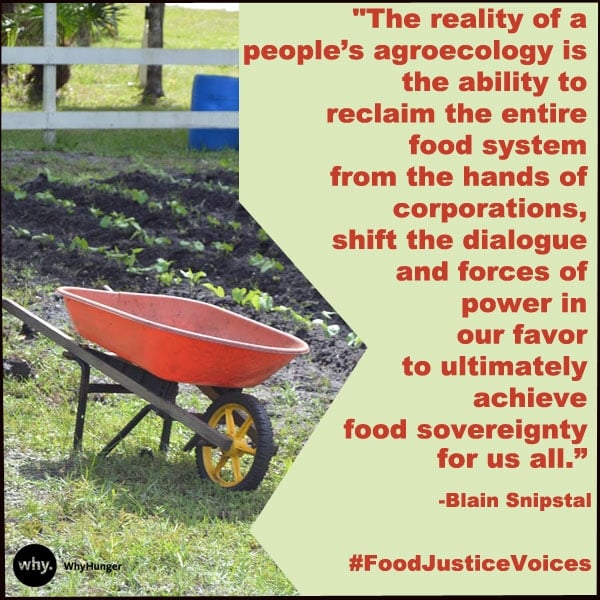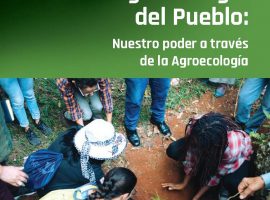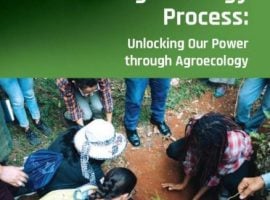This is the final article of the series “People’s Agroecology,”written by Blain Snipstal, a farmer at Black Dirt Farm. He is part of the leadership team for the Black Dirt Farm Collective. He is also works with SAAFON as a organizer. As part of the continuation of the Campesino a Campesino Agroecology Encounter led by farmworkers in the US, Blain visited four of the leading organizations in this effort to learn more about challenges and current practices to advance their goals through Agroecology.
“It should be very clear that US farmers are a small social force that alone have no chance of advancing reforms. Without a broad convergence between producers, consumers, and related workers – with strategic alliances with other key social movements for climate justice, indigenous rights, immigrants, and other human rights movements – there will not be enough social force to influence the current agrarian transition…This position does not invalidate the importance of class, race, gender, climate, or land issues in and of themselves. It recognizes that alliance between these struggles are fundamental for social transformation.” (Land Justice – Re-imagining Land, Food and the Commons in the United States, Food First)
Within the various narratives throughout the current debate around the true nature of our food system, we often focus our analysis and strategic actions across several narrow lines of thought – either food and market access as means to create local food systems; or farm and food production as supported by food policy and food justice. These threads of thought and debate often occur in silos — split across race, gender and class, and urban and rural lines. Moving forward to build an authentic and coordinated movement of peoples on the ground and in the streets, in the fields and behind the kitchen door, building intersectional alliances to confront the relations of power within the industrial model of agriculture is fundamental.
The collective expression of the various agricultural and food sector actors (farmers, fishers, food chain workers, farmworkers, etc.) to build alignment and solidarity around alternatives is critical. Yet alone, solidarity is not enough to reorganize the agrarian sector, nor is it enough to transition towards a new society. Agroecology is not possible without land/territory access, ownership and control. Without land, any real justice-based alternatives to the current corporate food regime (and capitalist society at large) will not have firm ground to stand upon.
At its inception, this series was an attempt to illuminate various actors within the food system that are using agroecology to advance their land-based and agrarian agendas. All the while, the goal included situating those experiences within a historical analysis that names the long-standing effects that the plantation model of agriculture and its modern version –the globalized industrial model of agriculture or agribusiness – has had on society at large.
Since the first article a year ago, the political conditions have changed significantly – many of which have brought us to question the very core of what makes America, “America.”
For instance, we have witnessed the enclosing of the public sphere through the aggressive advancement of white supremacy and patriarchy, propelled by state sanctioned violence. We have witnessed the impact of corporate-sponsored political campaigns and the growth of conservative thinking through the rise of ‘false’ populism and the evolution of fear through the idiocracy and crisis that is Trumpism. And we have witnessed a global capitalist trend to dig-in and further neoliberalism through the ‘Right’s’ recent victories throughout the world. The rapidity with which that has unfolded has shocked many of us, and yet for the rest of us that have been resisting and suffering from this political project for over 500 years, ‘this ain’t nothing new’. However, this moment has shown us many things, and of particular importance to this dialogue – we cannot forget that our struggle is material AND ideological and cultural in origin.
To close this series out, this article is organized within two frames: First a synthesis of the main points from the previous two articles, and secondly an analysis based upon experiences of frontline groups that have been utilizing agroecology in recent years, and for whom the “Land question” is the key and strategic center for convergence, and where intersectional alliances can be built.
Formación or ideological formation
Connecting this political moment back into the agrarian dynamic that is Agroecology and the call to massify it, we find a new home and need for the kind of Formación or ideological formation that was spoken about in the previous two articles. From the outset, the groups identified in this article series describe formation in a variety of ways, best encapsulated by Community-to-Community, “our formación is through action. We just do it.” They clarify that formación is about “creating the political space for more leaders to lead.” Also, important to note is that ideological formation is not just about the self-transformation of the individual, but about the ability to train folks to support the development of new social organizations and collectives, and to critically strengthen and advance existing popular organizations’ struggles for land and justice, within the agrarian dynamic.
Adding this to the historic call to Free the Land and to produce clean food, we find that a land-based agroecological formation process is one that is about nurturing new leaders that are equipped to build and bring us to a new society, rooted in harmonious relations with the land, the cosmos and each other. It is about bringing together a diversity of folk that construct new visions, which bring all of us to a new and just society. This kind of social movement methodology helps us win the hearts and minds of people, and continue fighting for the land of our people.
That is to say, can agroecology help to rearticulate the historic Black and Indigenous political causes of reparations, self-determination and sovereign territories within today’s political context?
Furthermore, this ideological formation has to be recognized as part of a radical Black, Indigenous and eco-feminist framework. This is crucial. Without a gender analysis within our ideological and productive processes, we will simply miss the boat and not get at the core of our own humanity. This is best said by Ana Elisa Pérez of La Finca Consciencia de Puerto Rico, de Boricua –
And while agroecology produces diversity, biodiversity; we should also cultivate a diversity of perspectives, people, and genders in order for it [agroecology] to be successful as a movement. If it’s only dominated by men, or another specific group of people, then obviously we will never have a true agroecology. I mean a real movement.
Social organization through agroecology encounters
Next, in this call to “Free the Land and Us, Too,” we have to uplift and reconnect the disarticulated sectors of society, particularly those within the food system. Groups like La Organización Boricua, FWAF, CATA, C2C, Black Belt Justice Center, Federation of Southern Cooperatives and the Mississippi Association of Coops, EcoHermanas, VietLied, Soil Generation, Soilful City, and the Black Dirt Farm Collective have been developing Regional Agroecology Encounters for the past several years as ways to place the aforementioned ideological formation process within a broader attempt to increase social organization and deepen relationships underneath the banner of agroecology.
These encounters, borrowed and tweaked from experiences within La Via Campesina and elsewhere, have served as a great place to bring together broad social bases within the food system – farmworkers, farmers, land owners, youth, restaurant workers, organizers and urban folk, so as to share experiences, deepen political ideologies and to equip folk with the technical skills necessary to build the pathway to a world in which we can thrive, and not just struggle to survive. Each of the encounters to date, dating back to 2012, have been based upon one common thread – the land + our labor = power. To unleash the creative, intuitive and productive capacity of the human-being and strengthen the host organizations is often the core objective of these events.
Bubbling up from the Deep South – where this process was initiated, this process of encountering each other has been small yet impactful. From these events that bring together a wide range of folks, we are able to exchange ideas and create meaningful ways for decentralized forms of collective-work to occur. Out of this multi-year and international process, we have learned a few things that are important to highlight and share:
•Encounters are not events alone by themselves. They must be connected to a political process and typically take multiple years of organizing in advance and are grounded in their particular regional/local cultural conditions. In other words, the “formación” we propose is an ideological training grounded in the experiences of organizing, e.g. it is a kind of “formación in movement”.
•Culture, spirituality and the arts are key elements that bring out the sacred elements of our lives and allow us to celebrate them, and therefore are critical. This piece is particularly important, for it allows us to revalorize and bring dignity back to our cultures and lives based upon the land.
•Technical training is critical and is often based upon the needs of either the participants or the local conditions. Managing micro-organisms, community forestry, business development, seed saving, using hand-tools, marketing, etc. are examples of themes that folks have developed. Here it is about transmitting the hand and mental skills needed to work in harmony with the land, not against her.
•Trainings are based on our experience as food producers. Agroecology is based on the knowledge that we acquire from others (our ancestors and each other) and most importantly by working the land and the oceans. Agroecological training is an ideological training because we are in direct confrontation with the dominant worldview of industrial agriculture.
•Provide space for ideological and political maturity to develop. This point brings us to remembering that these encounters are part of the long haul. This is not a fast process. It is built from our historical struggles and is designed to give us strength to continue to move forward. Making space for ideological and political maturity of our folk is fundamental.
•Agroecology is a big tent – an ‘Agrarian’ intersectional movement. In these events where many different perspectives exist, we have learned that agroecology can become a big tent – a unifying space that locates land as power, and articulates how the various threads of food sovereignty, climate justice, gender, housing, and human rights/labor justice and others, can build a shared process for working, visioning and articulating together. In this vein, agroecology can be used as the ‘infrastructure and political proposal for the just transition that many folks are now mainstreaming.
In the coming months and year, there are several encounters that will be taking place around the country within farmer, farmworker and Indigenous communities. We uphold that we don’t have all the answers, nor do we have a complete vision yet, we have a very clear understanding of how we want to arrive in a place where we can thrive, and so too can the land.
Building Beyond the Encounter
We need to recognize that since 1502, the development of the state and the architecture of agribusiness (the plantation model) have gone hand in hand. One cannot exist without the other. Almost every form of infrastructure in our society is built to support the industrial model –from the highway and railroad system to the land-grant universities (those established in both the 1890’s and the 1860’s); from financial institutions to public policies. One could argue that our capitalist society is organized by and for agribusiness.
Let us not forget that the name of the game, in part, is about production, i.e. feeding people. In order to feed ourselves and people in this context we must support and build the infrastructure for agroecology to flourish. The call to invest, or di-vest and then re-invest, into grassroots movements is nothing new. Yet, what makes this call to support a people’s agroecology slightly different is the nature of its ability to impact the rapidly changing ecological climate we now live in and strengthen our ability to manage through it. There is plenty of research to show that small-scale agroecological farming can cool the planet, increase yields over the long term and support the health of communities. However, the central question here is how can we get there in the face of state-sanctioned repression and the corporate control of land, water and other productive resources?
Over the past decade or so, within and without the process described in this series, many folks have moved on to land and reclaimed it or have been on land for generations and need help in making it viable and productive again. Together, these land-based experiences have cause us to ask – once we have land — what will we do with it and what do we need to make our land-based resistance strategies successful?
The reality of a people’s agroecology is the ability to reclaim the entire food system from the hands of corporations, shift the dialogue and forces of power in our favor and to ultimately achieve food sovereignty for us all. The new food system – of which we are already building – is intimately bound to the liberation of our people – Black and Brown – and the general wellbeing of humankind, the land and the natural world. This has been the struggle of our ancestors since the first colonial excursions over 500 years ago, and it will be the struggle of other young people for generations to come.
This “formación in agroecology” process is just the beginning, and it really is a re-articulation of previous struggles for land and self-determination in this country and beyond. It is the awakening of the recognition that we will not achieve what we want through the value systems imposed on us by the logic of capitalism and colonialism, and the supporting social strategies and structures of white supremacy, patriarchy and exploitation of the land. Looking forward we will need to define new pedagogies, organize new schools, and create new ways to deal with the soft yet influential power of philanthropy, individualism and the non-profit industrial complex. As visionary thinker and political prisoner Mumia Abu-Jamal says, “Without Struggle, There is Nothing,”and it is only through the struggle that we will be able to transform life.
Read the first article in this series.






